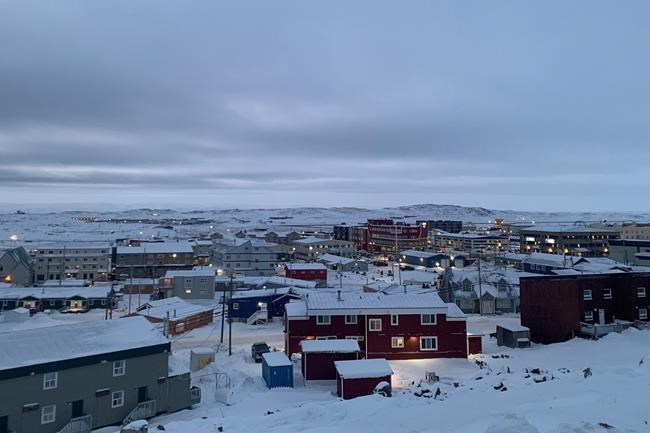IQALUIT, Nunavut — Nunavut has declared an outbreak of COVID-19 in Iqaluit and the premier says he expects there will be more cases.
Health officials reported 12 new infections Friday for a total of 13 active cases in the capital city of about 8,000 people.
The city went under a strict lockdown Thursday. It closed all non-essential businesses, government offices and schools after its first case in the pandemic was identified Wednesday. Residents are also being asked to restrict their contacts to members of their immediate household.
Premier Joe Savikataaq said he expects cases will continue to rise in the city.
"Please don't panic when you hear the daily numbers," he told a news conference Friday.
The territory's chief public health officer, Dr. Michael Patterson, said there isn't any evidence of community transmission. So far, all of the cases have been identified through contact tracing.
Patterson said the infections involve multiple households and how the virus entered Iqaluit is still unknown.
He also said, despite the suddenness of the outbreak, his team is prepared to deal with it.
"While this a serious situation, it is one that we can gain control of, contain and, in time, end."
COVID-19 was first reported in Nunavut last November. The territory's largest outbreak — 339 cases — was in Arviat, a community of about 2,800. That prompted a two-week lockdown of the entire territory, while Arviat itself stayed under restrictions until March.
One person died after contracting COVID-19 in the territory and three other Nunavut residents died after being infected elsewhere.
The first person in Iqaluit to test positive was a Canadian North airline employee who was in the territory for two weeks before showing symptoms. Patterson said given that timeline, it's possible the person contracted COVID-19 in Iqaluit.
Health Minister Lorne Kusugak urged Nunavummiut not to blame or shame essential workers, who don't need to complete Nunavut's 14-day quarantine requirement to enter the territory.
"Don't put people at risk. Please, don't treat people differently because of their jobs or circumstances. We are all in this together," Kusugak said.
Patterson echoed those comments.
"I would like to remind Nunavummiut that individuals who have tested positive so far come from different backgrounds, different jobs and circumstances," he said.
"Putting blame on others doesn't stop outbreaks. Following public-health measures, testing, tracing and isolating stops outbreaks."
Federal Indigenous Services Minister Marc Miller said Indigenous communities in Canada have been crushing the curve on COVID-19.
"However, events in Iqaluit and alarming outbreaks in some communities are painful and stark reminders of the public health measures that must be maintained."
Iqaluit Public Health has identified more than 70 new contacts through contact tracing.
The Health Department also sent out notice Thursday of a possible COVID-19 exposure risk for anyone who visited the Storehouse Bar and Grill, a popular Iqaluit bar, between April 8 and April 14.
Anyone who was there during those days must monitor for symptoms for 14 days after the last visit, and contact Public Health to get tested if symptoms develop.
Nunavut residents from other communities who left Iqaluit after April 7 are also asked to isolate for 14 days in their home community.
People from outside Iqaluit who were in town for a hearing on Baffinland's proposed expansion at its Mary River mine are being sent home and must also isolate for 14 days.
No one in Iqaluit has been hospitalized with COVID-19 to date, Patterson said, but anyone being admitted to the hospital is being tested for COVID-19.
Starting Monday, all rotational workers entering the territory can also get vaccinated.
Patterson said Nunavut has more than 20,000 swabs available to test for COVID-19 and the lab in Iqaluit can process 200 tests a day.
Nunavut has received enough Moderna vaccine to inoculate 75 per cent of the territory's adult population. Patterson has said that over 3,400 Iqaluit residents have received one dose and 2,000 have both required shots.
This report by The Canadian Press was first published April 16, 2021.
___
This story was produced with the financial assistance of the Facebook and Canadian Press News Fellowship.
Emma Tranter, The Canadian Press



